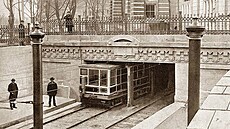Neviditelný pes
První český ryze internetový deník. Založeno 23. dubna 1996Diskuse k článku
USA: Nestejnost států pod stejnou střechou
Upozornění
Litujeme, ale tato diskuse byla uzavřena a již do ní nelze vkládat nové příspěvky.
Děkujeme za pochopení.

|
kvik 1.12.2005 21:52Socialni podpora v USA >>>" Před takovou pohromou se v minulosti černoši včas vzdálili. Tentokrát jejich část, pasivní, žijící ze sociální podpory, zůstala na místě a čekala, až se o ni stát postará.<<< Reverend Jesse a Ota zvani nesmysly! Zadna socialni podpora (ve forme penize zdarma) v USA neexistuje! Nikde! V Novem Orleansu muze matka s nezaopatrenym ditetem, neprovdana, dostati vymenou za odpracovani urciteho poctu hodin ve verejnych pracich neco kolem 200-300 dolaru mesicne od statu - z takove sumy neuzivite v USA ani psa! Dozivotni limit pobirani teto sumy je 5 let! Dale, opet vymenou za odpracovani se mohou amici kvalifikovat pro Food Stamps (takove jidelni stravenky) Nic jineho ti cernosi amici dostati nemohli a uz vubec ne to pobirat po generace! Devastujici bidu Tretiho Sveta jste mohli pozorovat na zaberech z Noveho Orleansu po rane hurikanove. |

|
Libor Jes 30.11.2005 2:17Re: Re: dokončení aneb iluzorní skazky p. Ulče Vazeny Cechoamericane,moje dcera vystudovala vysokou skolu za stipendia,tedy prospechova stipendia.Memu synovi vysoku zaplatila Motorola.Dneska kazde moje dite vydelavava vice nez ja se zenou dohromady.A to nezijeme v zemlijance,ani panelaku.Mate pravdu s tim SS,tedy duchodem.Ale v Cechach take neznam duchodce konzumujici po kilogramech kaviar.A pokud tady trochu pracujete a samozrejme si na SS platite,no snad to nejak dozijeme. |

|
Libor Jes 30.11.2005 2:00Re: Re: Pane Ulci, Milane,nejsem Cachoamerican.Jsem Cech s Americkym obcanstvim.Dokonce i moje deti se narodili v Cechac,ale jako malinke jsem je "privlekl"sem.Byl jsem za to odsouzern komunisty v nepritomnosti ke trem letum vezeni.Milane,ono me to do tech Cech porad tahne.Ale kdyz je tam porad takove politicke svinstvo. |

|
Tana Zajicova 29.11.2005 23:41Dusane, if you dig jazz pak byste se mel podivat do nejake dobre napsane biografie Luise Armstronga. Zivot cernochu v NO byl nepredstavitelne tezky a Armstrong vyrostl v tom nejhustsim podsveti. Jedinou skutecnou rodinu kterou poznal byla zidovska rodina, ktera ho zamestnavala (kosti, kuze..). Jeho prvni zena Daisy byla prostituka a ta N. Orleanske podsveti zosobnovala od lingerie po britvu v puncose (efektivni zbran pro pasaka a neverneho milence). Kdyby Armstronga jako kluka nezabasli a kdyby se nedostal v dome pro barevne delikventy do rukou dobrych lidi, nikdy bychom ho neslyseli (vychovny ustav mel band, ktery Armstrong pozdeji vedl).
Je zajimave ze Armstronguv band (Chicago period) se pri nataceni stridal ve studiu s Ku Klux Klanem a hned po nataceni museli vzdy vzit roha, aby neprisli o kejhak. Gutsy guys.
|

|
mik 29.11.2005 23:11Re: Pane Pašku... Boze, Saso, ty jsi vul. |

|
mik 29.11.2005 23:10Re: Re: Rasista Konstatovani faktu je rasismus? Odkdy? |

|
aida 29.11.2005 23:05Re: Re: Re: Re: Re: Re: Re: Re: Tady to je pro ty, kteri maji obsazeno. Dík.
|

|
Zuzana W 29.11.2005 22:51Re: Re: Re: Re: Re: Re: Re: Tady to je pro ty, kteri maji obsazeno. Early Development of Jazz - 1890 to 1917 Jelly Roll Morton Jelly Roll MortonBrass bands had become enormously popular in New Orleans as well as the rest of the country. In the 1880s New Orleans brass bands, such as the Excelsior and Onward, typically consisted of formally trained musicians reading complex scores for concerts, parades, and dances. The roots of jazz were largely nourished in the African-American community but became a broader phenomenon that drew from many communities and ethnic groups in New Orleans. "Papa" Jack Laine's Reliance Brass Bands, for instance, were integrated before segregation pressures increased. Laine's bands, which were active around 1890 to 1913, became the most well known of the white ragtime bands. Laine was a promoter of the first generation of white jazzmen. A special collaborative relationship developed between brass bands in New Orleans and mutual aid and benevolent societies. Mutual aid and benevolent societies were common among many ethnic groups in urban areas in the 19th century. After the Civil War such organizations took on special meaning for emancipated African-Americans who had limited economic resources. The purposes of such societies were to "help the sick and bury the dead" - important functions because blacks were generally prohibited from getting commercial health and life insurance and other services. |

|
Thyronx 29.11.2005 22:49Konkretne Ulci: Bremeno federalni dane jednotne pro cele USA cini 15%. Bremeno sales tax (DPH) cini ve 4 statech Unie cistou nulu a v tom co jde po mamonu nejvic v Kalifornii je to celych 7,25%.Pro Cecha platici 19% neuveritelne.A ohanet se tim ze za potraviny Cech vyda 5%? Well, vetsina statu v USA nema na potraviny a leky zadnou sales tax. Zivot v USA je velmi snadny,jednoduchy. Zivotni uroven kazdeho je JEN V JEHO rukou.Je-li vzdelany a podnikavy, ma nekonecne sance. V Cechach pouze s podplacenim a znamostmi.A ani to neni jiste. |

|
Zuzana W 29.11.2005 22:48Re: Re: Re: Re: Re: Re: Tady to je pro ty, kteri maji obsazeno. The Origins of Jazz - Pre 1895 Brass Band Marching Brass Band MarchingA review of New Orleans' unique history and culture, with its distinctive character rooted in the colonial period, is helpful in understanding the complex circumstances that led to the development of New Orleans jazz. The city was founded in 1718 as part of the French Louisiana colony. The Louisiana territories were ceded to Spain in 1763 but were returned to France in 1803. France almost immediately sold the colony to the United States in the Louisiana Purchase. New Orleans differed greatly from the rest of the young United States in its Old World cultural relationships. The Creole culture was Catholic and French-speaking rather than Protestant and English-speaking. A more liberal outlook on life prevailed, with an appreciation of good food, wine, music, and dancing. Festivals were frequent, and Governor William Claiborne, the first American-appointed governor of the territory of Louisiana, reportedly commented that New Orleanians were ungovernable because of their preoccupation with dancing. The colony's culture was enriched not only from Europe but from Africa as well. As early as 1721 enslaved West Africans totaled 30% of the population of New Orleans, and by the end of the 1700s people of varied African descent, both free and slave, made up more than half the city's population. Many arrived via the Caribbean and brought with them West Indian cultural traditions. |

|
Zuzana W 29.11.2005 22:48Re: Re: Re: Re: Re: Tady to je pro ty, kteri maji obsazeno. New Orleans music was also impacted by the popular musical forms that proliferated throughout the United States following the Civil War. Brass marching bands were the rage in the late 1880s, and brass bands cropped up across America. There was also a growing national interest in syncopated musical styles influenced by African-American traditions, such as cakewalks and minstrel tunes. By the 1890s syncopated piano compositions called ragtime created a popular music sensation, and brass bands began supplementing the standard march repertoire with ragtime pieces. |

|
Zuzana W 29.11.2005 22:47Re: Re: Re: Re: Tady to je pro ty, kteri maji obsazeno. Although dance in Congo Square ended before the Civil War, a related musical tradition surfaced in the African-American neighborhoods at least by the 1880s. The Mardi Gras Indians were black "gangs" whose members "masked" as American Indians on Mardi Gras day to honor them. Black Mardi Gras Indians felt a spiritual affinity with Native American Indians. On Mardi Gras day gang members roamed their neighborhoods looking to confront other gangs in a show of strength that sometimes turned violent. The demonstration included drumming and call-and-response chanting that was strongly reminiscent of West African and Caribbean music. Mardi Gras Indian music was part of the environment of early jazz. Several early jazz figures such as Louis Armstrong and Lee Collins described being affected by Mardi Gras Indian processions as youngsters, and Jelly Roll Morton claimed to have been a "spyboy," or scout, for an Indian gang as a teenager. |

|
Zuzana W 29.11.2005 22:46Re: Re: Re: Tady to je pro ty, kteri maji obsazeno. New Orleans' unusual history, its unique outlook on life, its rich ethnic and cultural makeup, and the resulting cultural interaction set the stage for development and evolution of many distinctive traditions. The city is famous for its festivals, foods, and, especially, its music. Each ethnic group in New Orleans contributed to the very active musical environment in the city, and in this way to the development of early jazz. A well-known example of early ethnic influences significant to the origins of jazz is the African dance and drumming tradition, which was documented in New Orleans. By the mid-18th century, slaves gathered socially on Sundays at a special market outside the city's rampart. Later, the area became known as Congo Square, famous for its African dances and the preservation of African musical and cultural elements. |

|
Zuzana W 29.11.2005 22:45Re: Re: Tady to je pro ty, kteri maji obsazeno. This rich mix of cultures in New Orleans resulted in considerable cultural exchange. An early example was the city's relatively large and free "Creole of color" community. Creoles of color were people of mixed African and European blood and were often well educated craft and trades people. Creole of color musicians were particularly known for their skill and discipline. Many were educated in France and played in the best orchestras in the city. In the city, people of different cultures and races often lived close together (in spite of conventional prejudices), which facilitated cultural interaction. For instance, wealthier families occupied the new spacious avenues and boulevards uptown, such as St. Charles and Napoleon avenues, while poorer families of all races who served those who were better off often lived on the smaller streets in the centers of the larger blocks. New Orleans did not have mono cultural ghettos like many other cities. |

|
Zuzana W 29.11.2005 22:43Re: Tady to je pro ty, kteri maji obsazeno. these newcomers began settling upriver from Canal Street and from the already full French Quarter (Vieux Carre). These settlements extended the city boundaries and created the "uptown" American sector as a district apart from the older Creole "downtown." The influx of black Americans, first as slaves and later as free people, into uptown neighborhoods brought the elements of the blues, spirituals, and rural dances to New Orleans' music. Ethnic diversity increased further during the 19th century. Many German and Irish immigrants came before the Civil War, and the number of Italian immigrants increased afterward. The concentration of new European immigrants in New Orleans was unique in the South. |

|
Zuzana W 29.11.2005 22:40Tady to je pro ty, kteri maji obsazeno. The Origins of Jazz - Pre 1895 Brass Band Marching Brass Band MarchingA review of New Orleans' unique history and culture, with its distinctive character rooted in the colonial period, is helpful in understanding the complex circumstances that led to the development of New Orleans jazz. The city was founded in 1718 as part of the French Louisiana colony. The Louisiana territories were ceded to Spain in 1763 but were returned to France in 1803. France almost immediately sold the colony to the United States in the Louisiana Purchase. New Orleans differed greatly from the rest of the young United States in its Old World cultural relationships. The Creole culture was Catholic and French-speaking rather than Protestant and English-speaking. A more liberal outlook on life prevailed, with an appreciation of good food, wine, music, and dancing. Festivals were frequent, and Governor William Claiborne, the first American-appointed governor of the territory of Louisiana, reportedly commented that New Orleanians were ungovernable because of their preoccupation with dancing. The colony's culture was enriched not only from Europe but from Africa as well. As early as 1721 enslaved West Africans totaled 30% of the population of New Orleans, and by the end of the 1700s people of varied African descent, both free and slave, made up more than half the city's population. Many arrived via the Caribbean and brought with them West Indian cultural traditions. After the Louisiana Purchase, English-speaking Anglo- and African-Americans flooded into New Orleans. Partially because of the cultural friction, these newco
|

|
Thyronx 29.11.2005 22:39Ulc = Idiot. Z USA kde chvilku pobyl si vzal jak se zda jen to nejhorsi. Husak a jeho strana by z tebe idiote meli radost.USA je natolik svobodna, ze stehovani dusi ze statu do statu nepodleha zadnym zakonum a jen vlastni vuli obyvatelstva. Do Louisiany nacpal FED takovy prachy, ze si to nemuze ani idiot predstavit (natoz napsat).Kazdy je strujcem sveho stesti a na rozdil od zemi EU kazdy muze v ramci Unie pracovat a zit kde chce. Ani toto zakladni pravo Cesi nemaji vsude v EU. Az budes zit Ulci v USA pres 20 let jako ja, a budes cist denne Vas tisk (le i Reuters), tak se ti to v hlave srovna. |

|
rejpal 29.11.2005 22:34Re: historie jazzu Dušane, už zase z USA, zdravím!! Jiank zjazzových stítů je, neprávem opomíjeno Idaho. University of Idaho v Moscow, Idaho už dekády pořádá jazzový festival, po jeho zakladateli, sponsorovi a předním ů§činkujícím pojmenovaný Lionel Hampton Jazz Festival , detaily na www. jazz .uidaho.edu. Další festival, The Gene Harris Jazz Festival, www. geneharris .org , je memoriál dalšímu velikánovi jazzu, znýmému více v Rvropě, než v USA, asi proto, že žil v oise, Idaho a ne v Chicagu, New Orleans , nebo Saint Luis. Nakonec i bývalý idaýský guvernér, pěstitel cibule jménem Phill att, hraje ďábelsky dixielandový klarinet a s Genem často během legislativní sezóny, kdy byl v oise místo na své farmě pěstující cibuli, tedy s Genem v bývalém restaurantu "Peter Schott's " každý čtvrtek jamoval. |

|
rejpal 29.11.2005 22:20Re: historie jazzu další link je http://www.jass.com/ |

|
Zuzana W 29.11.2005 22:14Re: Re: Re: Re: Kterej narodni opilec, Dusane? Inu, nevylecenej je kazdej, kdo se nelecil. ' Lecba' dalsi drogou se nepocita.
|

|
Dušan Neumann 29.11.2005 21:56Re: Re: Re: Kterej narodni opilec, Dusane? jestli z těch dvou co myslíte, tak ten nevyléčenej |

|
Zuzana W 29.11.2005 21:56Re: Re: Re: Kterej narodni opilec, Dusane? Fakt ale je, ze ten druhej narodni opilec uz lecos 'pozoruhodneho' spachal (krome opile jizdy na volantem, coz maji oba spolecne). (krome opile jizdy na volantem, coz maji oba spolecne).
|

|
Zuzana W 29.11.2005 21:53Re: Re: Kterej narodni opilec, Dusane? Znam dva a vobou neni zadna skoda. |

|
Dušan Neumann 29.11.2005 21:39Re: "Petre, vyguglujte si to!": on totiž národní opilec od té doby nic zapamatováníhodného nespáchal |

|
Alex Juchelka 29.11.2005 21:39Re: Ale dou Juchelko . . . . Pane Pašku, Vy zaměnujete nenávist s pohrdáním a odporem ke kriminálním činům a lžím, které jsou průvodním znakem naší současné vlády v čele s jejím neschopným presidentem. Pro Vaši informaci - já jsem Bushovo zvolení nikdy nijak moc nezpochybňoval. Bush byl zvolen mimo jiné podobnými pitomci, jako jste Vy, i když mnozí z jeho bývalých voličů Bushova zvolení již prozřeli a svého hlasu dnes litují. Vy jste na rozdíl od nich konsistentní blbec - a i když s Vámi téměř v ničem nesouhlasím, takové zásadovosti si vážím a pokaždé se jí, při návštěvě zdejších stránek, velmi bavím... |

|
DJing cheb pako 29.11.2005 21:39Na Vrbu může psát kdokoliv proto asi Juchelka vstava kazdy den v pet rano, aby vcas vygumoval nocni nepriznive komentare a jako admin Vrby blokuje IPecka z poloviny zemekoule
   . .Zase lze, Juchyl, jako obycejne...
|

|
Dušan Neumann 29.11.2005 21:37historie jazzu Petře, asi nejjednodušší a také nejpříjemněší pohled do historie jazzu je PBS sponzorovaný dokument Ken Burnse dostupný v knihovnách na DVd nebo VHS. Jeden link je tady http://www.pbs.org/jazz/time/ |

|
Sarka 29.11.2005 21:32V tom pripade muze ale stat, v nemz ke kriminalnimu cinu doslo, pozadat o vydani - a bezne se zlocinci pres hranice statu vydavaji, takze pak jest dotycny souzen ve state v nemz zlocin spachal a nepotrebuje spadat pod Federal. |

|
Alex Juchelka 29.11.2005 21:31Re: "Petre, vyguglujte si to!": Tak nějak... Kennedy musí být Ježíš, trpící za hříchy všech Republikánů a Clinton je jeho prorok... : ) Rovněž se mi líbilo, jak náš přírodu milující 'rybář' před časem nadával na jakousi 'zeleňačku' (určitě Demokratka...), které vadí, že dva velrybí žraloci, úžasná, chráněná stvoření, musí plavat od zdi ke zdi v Atlantském akváriu, ale to by bylo na jinou debatu... : ) |

|
G. Pašek 29.11.2005 21:22Ale dou Juchelko . . . . Juchelko, takovejm psychopatickejm blbům jako jsi ty jsem se už vyhýbal v ČSSR a vyhýbám v USA jakbysmet.
Jsou lidé a la Juchelka, Janeček a spol. které nenávist pro našeho porezidenta Bushe uvádí k šílesenosti a trumfuje vše, ať to je co je a fandí extrémním muslimům a mnou si ruce z každého USA neúspěchu v Iráku.
Nikdy se nesmířili, že prezident Bush obě volby vyhrál ve férových volbách.
A s takovejma hluchoněmejma slepcema debata o čemkoliv je zbytečná.
Ahoj
Jo, a řekni tomu blbovi Janečkovi, aby místo šmejdění v Sorose žumpách a kopíroval a tady lepil kdejakej prd tam najde, radši studoval historii.
|





